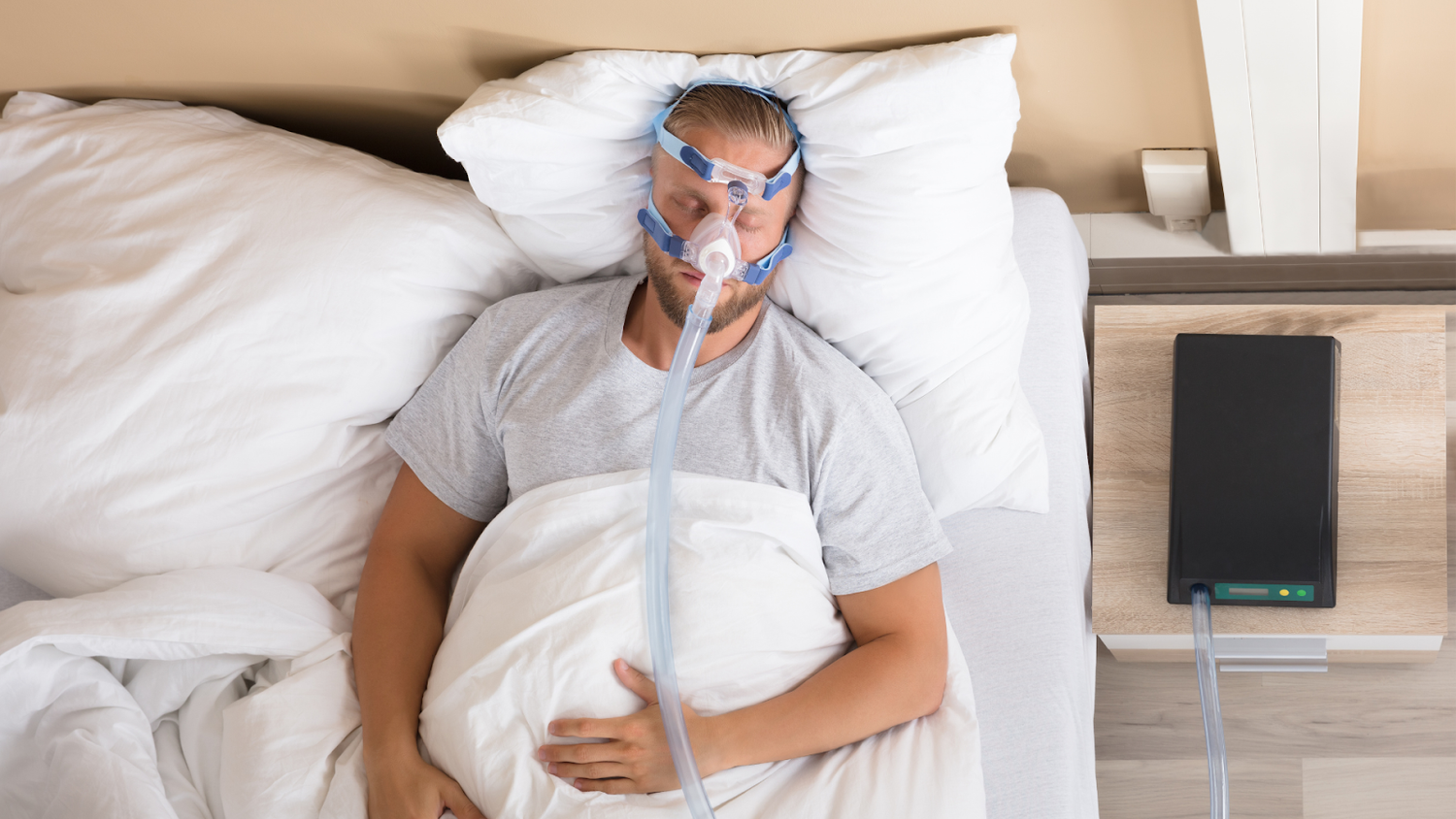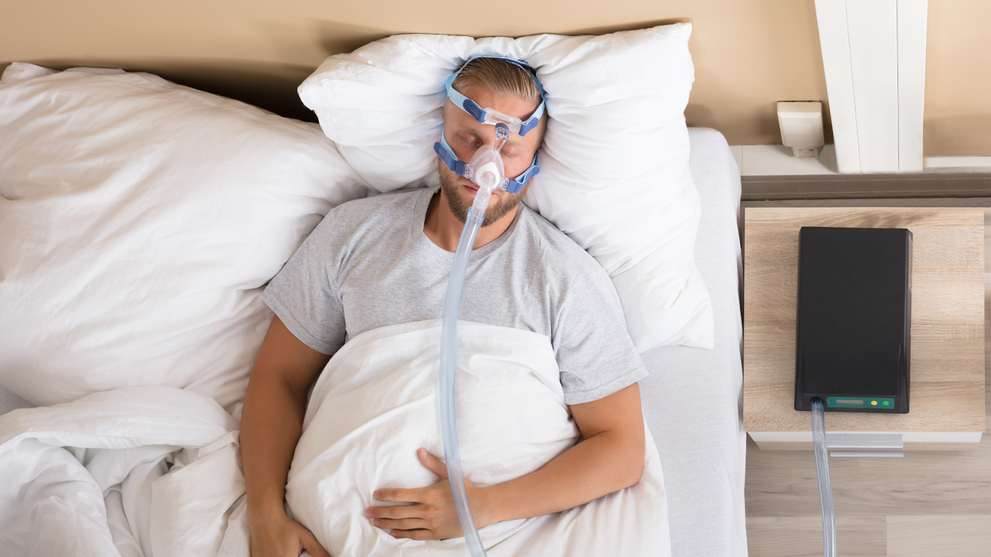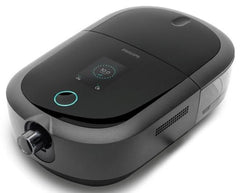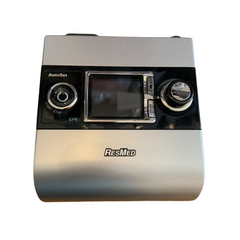Key Takeaways:
- Temporary Use is Acceptable: Using bottled water for one night is unlikely to harm your CPAP, but it shouldn’t become a habit.
- Distilled Water is Essential: Only distilled water ensures your humidifier stays free from mineral buildup and bacterial growth.
- Clean After Exceptions: If you must use bottled water, rinse and clean your water chamber thoroughly the next day to minimize risk.
Among the many questions we receive from CPAP users, one comes up time and again: Can I use bottled water in my CPAP for just one night? Whether you’re traveling, forgot to refill your distilled water, or find yourself in a pinch, it's important to know what’s safe for your machine, and your health. CPAP therapy isn’t just about airflow; humidification plays a pivotal role in keeping your airways comfortable, and the water you use matters more than you might think.
As one of the most trusted retailers of CPAP machines, oxygen concentrators, and refurbished medical equipment, Help Medical Supplies has become a go-to resource for affordable and reliable sleep therapy solutions, without the red tape of insurance. Thousands of customers across the country count on us not just for high-quality products, but for clear, accurate guidance that supports their everyday health needs.
In this piece, we’ll discuss when using bottled water is okay, what the risks are, and how to keep your CPAP machine running safely and smoothly, even when distilled water isn’t available.
Why Water Quality Matters In Your CPAP Machine
CPAP machines are designed to deliver consistent, pressurized air to help individuals with sleep apnea breathe more easily throughout the night. Many CPAP devices include a built-in humidifier to keep airways from drying out. The water used in this humidifier plays an integral role in hygiene and machine maintenance.
Using clean, distilled water helps prevent mineral buildup inside the machine’s water chamber. Tap water, spring water, or other untreated sources can leave behind mineral deposits, which may damage the equipment over time and encourage the growth of bacteria, mold, or algae.
CPAP machines work best and last longer when they’re maintained properly. That includes using the right kind of water to avoid preventable issues with performance and cleanliness.
Don’t risk your equipment with the wrong accessories. Shop the best selection of CPAP supplies at unbeatable prices, without dealing with insurance delays.
Can You Use Bottled Water In A CPAP For One Night?
If you’re traveling, ran out of distilled water, or just forgot to refill your CPAP humidifier, it’s natural to wonder if bottled water is a safe alternative, especially for one night. The short answer: yes, most bottled water is safe to use occasionally, but it’s not ideal.
Bottled water is generally filtered and treated to meet drinking standards, which means it’s usually free from harmful microorganisms. However, it still contains trace amounts of minerals like calcium and magnesium. These minerals can leave residue in your humidifier chamber and, over time, may contribute to scaling or bacterial growth.
So, while using bottled water in your CPAP for a single night won’t ruin the machine, it’s something you shouldn’t make a habit of. For long-term use, distilled water remains the safest and most equipment-friendly option.
Types Of Bottled Water And What They Contain
Not all bottled water is the same, and when you're relying on it for your CPAP humidifier, the differences matter. Here's a closer look at the most common types:
Purified Water
Purified water has gone through a filtration process to remove many impurities and contaminants, often including chlorine and some minerals. While it's generally cleaner than tap or spring water, it still may contain trace levels of minerals that can cause buildup in your CPAP machine over time. It's a better option than spring or mineral water if you're in a bind, but it’s still not the first choice.
Spring Water
This water is collected from natural underground springs and is often marketed for its “fresh” or “natural” qualities. However, it contains naturally occurring minerals like calcium, magnesium, and sodium, elements that can leave behind deposits in your CPAP humidifier. While it’s safe to drink, it’s not ideal for use in any medical device, even for one night.
Mineral Water
Bottled mineral water contains high concentrations of dissolved minerals, which can vary depending on the source. These minerals may be beneficial when consumed, but they’re harmful to your CPAP equipment. Even a single use can contribute to scaling and residue inside the water chamber, making mineral water one of the least recommended options.
Distilled Water
Distilled water is the gold standard for CPAP use. It has been boiled into steam and condensed back into water, a process that removes virtually all impurities, bacteria, and minerals. Because it leaves no residue behind, it helps extend the life of your CPAP machine and prevents microbial growth inside the humidifier.
Potential Risks Of Using Bottled Water
While using bottled water in your CPAP machine for a single night isn’t likely to cause immediate damage, there are still risks to be aware of, especially if it becomes a recurring habit.
Mineral Buildup
Even small amounts of minerals in bottled water can leave behind residue in the humidifier chamber. Over time, this buildup can lead to scaling, which affects the efficiency of the heating element and makes cleaning more difficult.
Bacterial Growth
Non-distilled water can create an environment where bacteria or mold may grow, especially if the water isn’t emptied daily. The warm, moist setting of a CPAP humidifier is already prone to microbial growth, and using anything other than distilled water increases that risk.
Machine Wear And Tear
CPAP devices are precise medical machines. Using water with impurities, even minor ones, can shorten the life of components, like the humidifier plate or the water chamber, leading to costly replacements sooner than necessary.
What To Do If You're In A Pinch
Life happens; sometimes you’re away from home or run out of distilled water late at night. If you're in a situation where you have no choice but to use bottled water in your CPAP machine for one night, it’s better to use it than to skip therapy altogether.
From humidifier chambers to travel-sized essentials, Help Medical Supplies is your one-stop source for dependable, brand-name equipment. We make it easier and more affordable to stay compliant with your therapy.
Choose The Cleanest Option Available
If you have access to purified bottled water, that’s generally the best temporary alternative. Avoid mineral or spring water if possible, since those contain the most impurities that can harm your equipment.
Use The Minimum Amount Necessary
Only fill the humidifier to the required level, and don’t top it off the next night without cleaning it first. Empty and rinse the chamber thoroughly the next day to remove any remaining residue or contaminants.
Clean Your Machine Thoroughly
After using bottled water, clean and dry your humidifier chamber before your next use. If you have a backup chamber, consider rotating it in while the used one is soaking or air-drying.
Best Practices For CPAP Humidification
Keeping your CPAP machine running smoothly isn’t just about what kind of water you use; it’s about how you maintain the entire humidification system. Following a few simple best practices can help extend the life of your machine and keep your therapy safe and effective.
Always Use Distilled Water Whenever Possible
This is the best way to avoid mineral buildup and contamination. Distilled water ensures your humidifier stays clean and functions efficiently over time.
If you want access to distilled water anywhere, consider a Distilled Water Filter. The H2O 4X Ion-Distilled Filtration System instantly converts tap water into distilled-quality water for CPAP and BiPAP users. Portable and affordable, it protects your equipment and ensures safe humidification at home or on the go.
Empty And Rinse The Water Chamber Daily
Leaving water sitting in the chamber can lead to bacterial growth, especially in warmer environments. Make it a habit to empty, rinse, and air-dry the chamber every morning.
Deep Clean Your Humidifier Weekly
Use a mild dish soap or a 1:3 vinegar-to-water solution to disinfect the chamber once a week. Be sure to rinse thoroughly and let it air dry completely before using it again.
Inspect The Chamber For Wear
Over time, plastic water chambers can crack, discolor, or build up residue that’s hard to remove. If you notice any of these signs, it’s time to replace the chamber; most manufacturers recommend doing so every 6 months.
Where To Get CPAP Supplies You Can Trust
Using the right water in your CPAP machine is a small but important part of your sleep therapy routine, and having access to reliable supplies makes it easier to stay consistent. At Help Medical Supplies, we carry a wide selection of CPAP accessories, including replacement water chambers, cleaning solutions, and travel-friendly distilled water options.
Whether you need a full machine setup or just a spare part for your humidifier, you’ll find affordable pricing, refurbished options, and fast shipping to get you what you need, when you need it. Our goal is to make it easier for you to take care of your equipment and your health, without the hassle of going through insurance.
Explore our full line of CPAP supplies today at Help Medical Supplies, and stay prepared for every night’s sleep.
Final Thoughts
If you’re asking, “Can I use bottled water in my CPAP for one night?”, the answer is yes, but only when necessary. Bottled water can serve as a temporary solution in a pinch, but it’s not a long-term substitute for distilled water. Even occasional use of water with minerals can leave behind residue, reduce the lifespan of your equipment, and introduce unwanted bacteria.
The best approach is to plan ahead and always keep a supply of distilled water on hand, especially if you travel frequently or rely on your CPAP every night. And if you're ever unsure about what you need, Help Medical Supplies is here to support you with trusted CPAP accessories and expert guidance. Your health and your equipment deserve the best care possible.
Read Also:
- CPAP Accessories & Replacement Parts That Will Help You Get The Most From Your Treatment
- Why The ResMed AirMini AutoSet Travel CPAP Is The Perfect Travel Companion
- The Benefits Of Buying A CPAP Bundle
Frequently Asked Questions About Using Bottled Water In A CPAP Machine
Is using bottled water in a CPAP machine once a week harmful?
Occasional use, like once a week, likely won’t harm your machine right away, but repeated exposure to minerals may lead to long-term buildup and performance issues.
Can I boil bottled water to make it safe for my CPAP?
Boiling kills bacteria but doesn’t remove minerals. Only steam distillation can effectively purify water for CPAP use.
Does bottled water void a CPAP machine’s warranty?
Most manufacturers recommend distilled water, and using other types may not directly void your warranty, but damage caused by residue may not be covered.
Is it safe to use bottled water in a heated humidifier chamber?
It’s safe for one-time use, but heating mineral-rich water can speed up scaling inside the chamber, which is hard to clean and may reduce efficiency.
Can using bottled water in a CPAP cause respiratory issues?
Not usually after one use, but regular use could increase the risk of exposure to irritants or bacteria if the chamber isn't cleaned thoroughly.
Are there travel-size options for distilled water?
Yes. Some brands offer travel-friendly, TSA-compliant bottles of distilled water. Help Medical Supplies also offers compact options ideal for travel.
Is reverse osmosis water okay for CPAP use?
Reverse osmosis water is close to distilled in purity, but may still contain trace minerals. It’s better than tap or spring water, but not ideal long-term.
How can I tell if bottled water has minerals?
Check the label for a mineral content breakdown or terms like “spring water” or “mineral-enhanced.” If it doesn’t say “distilled,” assume it contains minerals.
What’s the best way to store distilled water for CPAP?
Keep it sealed, out of sunlight, and away from heat. Store in BPA-free containers to avoid plastic leaching, especially in warmer environments.
Does using bottled water affect the air quality from my CPAP?
Over time, mineral residue can alter humidification consistency, which may indirectly affect the comfort and cleanliness of the air delivered through the device.







